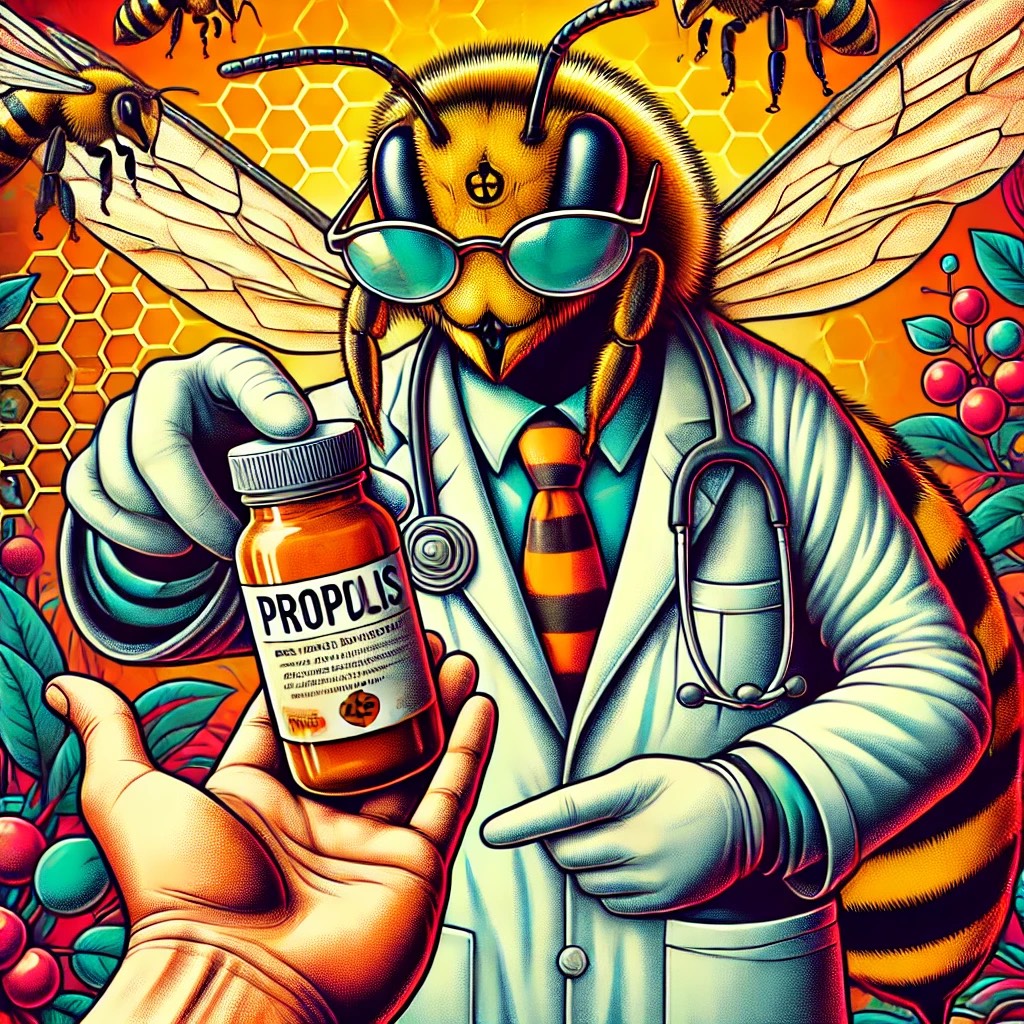Bee Propolis- Sticky Secret to Gut and Immune Health
 When life gives you bees, you get honey, right? Wrong. You get bee propolis, a magical substance that makes honey look like a sidekick. Sure, honey is sweet, but propolis is the REAL DEAL. Used by ancient Egyptians, Romans and Greeks, bee propolis is nature’s tool for healing. As I will discuss, it contains various unique substances that positively influence the body. From boosting your gut health to calming down those overdramatic mast cells, propolis is the hero we didn’t know we needed.
When life gives you bees, you get honey, right? Wrong. You get bee propolis, a magical substance that makes honey look like a sidekick. Sure, honey is sweet, but propolis is the REAL DEAL. Used by ancient Egyptians, Romans and Greeks, bee propolis is nature’s tool for healing. As I will discuss, it contains various unique substances that positively influence the body. From boosting your gut health to calming down those overdramatic mast cells, propolis is the hero we didn’t know we needed.
Bee Propolis- Unique Prebiotic and Antimicrobial
Welcome to your gut, a bustling metropolis teeming with bacteria, both the friendly kind and the ones plotting your downfall. If your gut is New York City, think of propolis as Spider-Man, swinging in to save the day. This bee glue has some serious antimicrobial powers, and it’s super picky about who it takes down. Unlike antibiotics that bomb your gut, killing everything in sight, propolis targets the bad guys, and feeds the good guys.
There was a study from Evidence-Based Complementary and Alternative Medicine that showed that propolis helps boost the good bacteria like Lactobacillus and Bifidobacterium, the gut’s equivalent of the Avengers. They help digest food, keep inflammation down, and even boost your mood. That’s right; your gut is basically running a feel-good factory, and propolis can make sure everything runs smoothly. So, if you’re feeling down, maybe it’s not just the Monday blues. Maybe you need more bee glue in your life.
Propolis Tells the Mast Cells to Chill Out!
Mast cells are the drama queens of your immune system. They’re like that friend who loses it every time they get a paper cut. The moment they sense danger, they explode with histamines, causing all sorts of chaos, itching, swelling, and sneezing. If your immune system was a reality TV show, mast cells would flip tables and storm off set. But propolis? Propolis is the calm, collected friend who hands the mast cells a cup of tea and tells them to chill out.
Studies have shown that propolis can inhibit mast cell degranulation, which is the fancy term for “mast cells losing their cool and making your life miserable.” By keeping these cells in check, propolis helps prevent allergic reactions, reduces inflammation, and generally keeps the peace. So, if you’re tired of being a human histamine factory every spring, propolis might be your new best friend. Though it is just one of many histamine intolerance supplements, it may be one of the best.
Propolis Boosts Immune System to Another Level
Your immune system is your body’s own personal army, always on high alert for invaders. And just like any army, it needs a good defense strategy. Propolis steps in as the ultimate immune booster, loaded with flavonoids, aromatic acids, and a bunch of other scientific-sounding stuff that basically means it’s really good for you. It’s like giving your immune system a shot of espresso, suddenly, everything’s faster, sharper, and more alert.
Research published in the Journal of Ethnopharmacology found that propolis stimulates the production of antibodies and activates macrophages, the immune cells that eat up pathogens like they’re at an all-you-can-eat buffet. Imagine your immune system as a highly efficient cleaning crew, and propolis as the boss making sure everyone’s doing their job. Whether it’s viruses, bacteria, or that mysterious funk in the back of your fridge, propolis has got it covered.
Sharpen your Mind with the “Bee Glue”
Let’s not forget about the brain. After all, it’s pretty important! Propolis is packed with antioxidants, which are like the bouncers of the brain world, keeping out the riffraff and making sure only the right molecules get in. Oxidative stress? Not on propolis’s watch. It’s been shown to reduce the risk of neurodegenerative diseases like Alzheimer’s, acting like a bodyguard for your neurons. Who knew bee glue could make you smarter?
Your Skin will Love Bee Propolis for Many Reasons
And then there’s your skin, which is exposed most to the outside world. Propolis is here to help with its antimicrobial, anti-inflammatory, and healing properties. It’s like having a spa day every day, minus the overpriced cucumber water. Propolis speeds up wound healing, reduces scarring, and even fights acne. It’s basically a beauty serum from the bees, and trust me, your skin will thank you.
Frequently Asked Questions about Bee Propolis
How often and how much bee propolis should I take?
Your dosage will depend on the condition. If you are using it for gut health, between 2-4g per day, 6 days a week, would be good. If it is being used for basic immune health, I would say 1500mg per day, 5 days a week, would be plenty. I would always take it 30 minutes before food, and would never exceed 3g per dose. Keep in mind that these are not recommendations; they are my experiences.
What should I expect when I start using bee propolis?
You may feel a bit more energy, improved mood, better digestion of larger meals, more productive bowel movements, sharper thinking and more. I felt some of these things within days of using it. Keep in mind though, it might take a few weeks to notice benefits.
Is there a specific brand that is better than the rest?
Keep in mind, BRAND MATTERS when it comes to propolis. I have used the raw bee propolis from Eco Bee Farm in CAPSULES. You can also look for raw propolis on ebay. I saw that many farmers were selling their propolis, and it looked quite impressive. If you choose to purchase a different brand, just make sure its not a liquid.
What are the potential downsides of using bee propolis?
If you take too much of it, it can make you either tired or overstimulated. I never really go beyond 3g per dose because it seems to be too much for me. The only time I have seen someone react negatively to bee propolis is when they were living in a moldy house. In that case, they were reacting to almost everything else we tried.
Does bee propolis have any anti-allergy properties?
Yes, it can be helpful in reducing the severity of allergies. I don’t expect it to help someone beat the allergies on its own, but it definitely can be an essential part of the puzzle. In addition, if someone is struggling with mast cell activation or histamine intolerance, bee propolis can help reduce the severity of their reactions.
Conclusion: All Hail the Bee Glue!
From the gut to the brain, from mast cells to the immune system, bee propolis is nature’s way of saying, “I’ve got your back.” So next time you’re marveling at a bee buzzing around, remember: these little guys are more than just honey producers. They’re the creators of propolis, the sticky substance that saves your gut, calms your immune system, and makes you smarter. All hail the bee glue!
If you have questions about using bee propolis for gut health, mast cell activation, or other health issues, get in touch. I have worked with it for years, so I understand its potential and application very well.
Happy healing everyone!
Matt Nedin, B.S.
Certified Holistic Nutritionist
Endsickness, Founder
Phone: (734) 846-8619
WhatsApp: +17348468619
Email: endsickness@gmail.com
References
- Pytel, M., Bobiński, R., & Mularczyk, A. (2019). Propolis: Properties, application, and treatment. Evidence-Based Complementary and Alternative Medicine, 2019.
- Park, E. H., & Kahng, J. H. (1999). Suppressive effects of propolis in rat adjuvant arthritis. Archives of Pharmacal Research, 22(6), 554-558.
- Sforcin, J. M., & Bankova, V. (2011). Propolis: Is there a potential for the development of new drugs? Journal of Ethnopharmacology, 133(2), 253-260.
- Machado, J. L., Assunção, A. K., da Silva, M. C., dos Reis Barbosa, W. L., Guerra, R. N., de Barros, C. H., … & Arruda, M. S. (2012). Comparative study of chemical composition and biological activity of yellow, green, red, and brown Brazilian propolis. Evidence-Based Complementary and Alternative Medicine, 2012.
- Orsatti, C. L., Missima, F., Pagliarone, A. C., Bachiega, T. F., Búfalo, M. C., Araújo, J. P., & Sforcin, J. M. (2010). Propolis immunomodulatory action in vivo on Toll-like receptors 2 and 4 expression and on pro-inflammatory cytokines production in mice. Phytotherapy Research, 24(8), 1141-1146.
- Kurek-Górecka, A., Górecki, M., Rzepecka-Stojko, A., Balwierz, R., & Stojko, J. (2020). Bee products in dermatology and skin care. Clinics in Dermatology, 2020.








